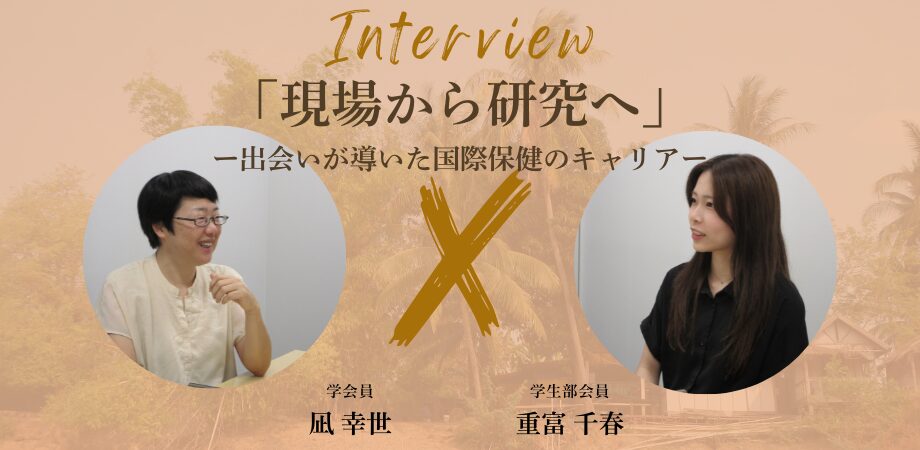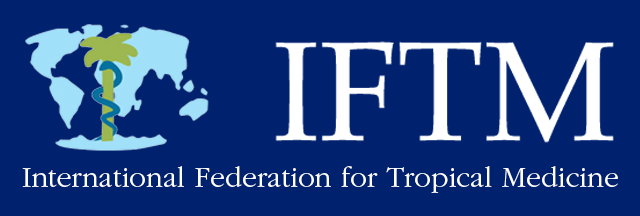
Supporting Behavior Change Through Research
Shigetomi:
Could you tell us about the work you are currently engaged in?
Nagi:
My work involves both teaching and research. In terms of education, I give lectures and supervise practical training for students in the School of Medicine and the School of Nursing. As for research, I mainly conduct epidemiological studies on infectious diseases such as schistosomiasis and tuberculosis in Kenya.
Shigetomi:
What led you to your current career?
Nagi:
Meeting Japanese researchers in Kenya was a major turning point. They encouraged me and showed me the path of becoming a researcher. When I was a child, I lost a finger in an accident, but thanks to surgery, it was successfully saved. As I grew up, I often thought to myself: “What would my life have been like if I had not been able to receive surgery at that time?” It no longer felt right to simply consider it “good luck.” This personal experience gradually shaped a strong desire to contribute to reducing health disparities.
Motivated by this, I joined the Japan Overseas Cooperation Volunteers (JOCV), transferred to a university program after returning to Japan, attended a graduate school of public health in Kenya, and eventually pursued a doctoral degree.
Today, as a researcher, I continue to explore solutions for improving people’s health through collaborative research with colleagues I met during my graduate studies in Kenya. I hope to keep finding ways to contribute to community health while enjoying the process.
Shigetomi:
So your relationships from graduate school in Kenya continue to influence your current work. What would you say is the strength of your research?
Nagi:
One of the key goals of epidemiological research is to translate scientific evidence into policy. Presenting research evidence can contribute to people’s health even after we leave the field. I am particularly interested in health behavior science, which bridges health education and health promotion. I am good at designing studies based on health behavior theories and applying those theories to health education and awareness-raising activities.
During my graduate studies in Kenya, I majored in health promotion to learn this systematically. One of the textbooks we used was the “Theory at a Glance: A Guide for Health Promotion Practice” (National Cancer Institute). Along with “Health Behavior: Theory, Research, and Practice,” it has served as a compass for my work. In recent years, excellent resources covering Japanese contexts—such as “Research and Practice Based on Health Behavior Theory,” edited by the Japan Society of Health Education—have also become available, and I am grateful to the experts who have paved the way so that everyone can access the right to health.

Learning and Challenge Sparked by the JOCV Experience
Shigetomi:
You hold a degree in health sciences. Could you tell us more about your academic background?
Nagi:
Health sciences encompass many areas such as nursing and radiology. I specialized in clinical laboratory science. As I gained knowledge and skills during my studies, I increasingly felt a desire to contribute them to communities with limited medical resources. So after graduation, I joined the Japan Overseas Cooperation Volunteers. Following my assignment in the Maldives, I transferred to a university program in Japan and earned my degree in health sciences.
Shigetomi:
What kind of work did you do in the Maldives?
Nagi:
At that time, the Maldives suffered from a shortage of clinical laboratory technologists, especially in rural hospitals, which relied heavily on foreign staff. I spoke with the hospital director and arranged for local staff to be assigned to the lab three times a week. I provided training in laboratory procedures and techniques and created English training materials and examinations to ensure that the local team could continue the work after foreign personnel—including myself—left.
Through this experience, I learned the importance of understanding on-the-ground challenges and developing sustainable solutions.
Shigetomi:
Did your experience in the field change your perspective?
Nagi:
I joined the JOCV thinking I would contribute what I had learned, but I found that I was the one learning far more. I realized how naive my initial mindset had been. This experience played a major role in my decision to transfer into a four-year university after returning to Japan.

From Bottom-Up Action to Research
Shigetomi:
What was your daily life like during graduate school in Kenya?
Nagi:
In the first year, I was overwhelmed with classes, assignments, and exams. In the second year, I began my field research and gained more flexibility in managing my schedule. Around that time, friends I met during a JICA capacity-building program introduced me to an NGO—Friends of Kenyan Children—and I began working there while conducting my research. Those experiences, where learning and practice were closely linked, were truly fulfilling, and I am grateful to the many people who supported the project.
Shigetomi:
What did you do after that?
Nagi:
Dr. Tomohiko Sugishita, who was then the chief advisor of a health management strengthening project in Kenya, invited me to join as a capacity-building advisor. I worked on the project for about a year.
The most valuable part was the opportunity to hear directly from health administrators, local hospitals, and community members during training and field visits. Seeing the actual challenges they faced made me realize that bottom-up efforts alone are not enough—progress requires combining both top-down and bottom-up approaches.
Shigetomi:
Did these experiences influence your decision to pursue global health research?
Nagi:
Yes, that was part of it. But the influence of the people I met through the JOCV was even stronger. A friend I met through the program passed away from malaria in Zambia. Facing that reality was extremely painful—but coming to terms with it is what motivated me to pursue infectious disease research.
Choosing a Specialization
Shigetomi:
As someone also in health sciences, I’m interested in your thoughts on the role of non-physician health professionals in global health.
Nagi:
Many different professionals contribute to supporting an individual’s health—not only physicians. What matters most is finding a field where you can make the best use of your strengths.
Shigetomi:
Finding your own strengths is something I’m struggling with right now.
Nagi:
I understand that very well—I struggled too. One way is to use what you’ve already learned in health sciences as a foundation, and then identify what matters most to you. If you find an area where you feel confident or find joy in the work, that’s a good direction to pursue.
Shigetomi:
This may be a broader question, but how do you view the significance of Japanese people engaging in global health?
Nagi:
Personally, I don’t think about it in terms of nationality. What matters is whether someone feels, “I want to try this” or “I might be able to contribute.” It’s not about being Japanese—it’s about having a goal and taking the necessary steps toward it. So I don’t feel there is any particular need to attach special significance to Japanese participation.
Shigetomi:
Hearing that makes me realize that nationality itself does not carry special meaning in the context of global health.
Challenges in Kenya and Creating Opportunities for Action
Shigetomi:
What are your goals moving forward?
Nagi:
I hope to expand my work beyond research to activities carried out with local communities. In our epidemiological studies in Kenya, we trained local residents as field surveyors and conducted questionnaire surveys. Increasingly, many of these trained surveyors are young people who have graduated from universities or vocational schools—they are valuable human resources for their communities. Yet opportunities for them to apply their skills locally remain limited.
To address this, I am currently working with former classmates and colleagues from Kenya to develop a platform that uses a human-resource registry to expand opportunities for local talent.
In research, I am also working to build foundations for applying social capital—people’s social ties—to public health interventions. For instance, in one of our studies, we provide infection-prevention education to children and assess whether the knowledge and behaviors they acquire spread to others in the community, creating a “spillover effect.” By identifying the factors that influence educational effectiveness and building mechanisms to share and use these findings, I hope to contribute to improving the social environment that shapes people’s health.
I also expect that the growing network of trained surveyors will help enhance health literacy across communities.
Shigetomi:
Do you have any advice for students?
Nagi:
It’s important to expose yourself to different ways of thinking and diverse value systems. Everyone has unforgettable experiences or moments that deeply move them—sharing those feelings and reflecting on yourself objectively can spark personal growth.
Meeting people and reading books can also broaden your perspectives. When you’re heading in the wrong direction, having someone who says, “Are you sure that’s right?” or “Maybe you should consider this instead,” is invaluable. The ability to listen to such advice and adjust your course when necessary is essential for navigating life.
Shigetomi:
Thank you very much for all the insights you’ve shared.

Profile of Interview Participants
Dr. Sachiyo Nagi
Assistant Professor, Department of Hygiene and Public Health (Global Health Division), School of Medicine, Tokyo Women’s Medical University.
After serving as a JICA Overseas Cooperation Volunteer in the Maldives, she transferred to the Faculty of Health Sciences at Okayama University. She later worked with the international NGO Family Health International (FHI) in Kenya and earned an MPH from Moi University. She completed her PhD in Medicine at Nagasaki University before working at Kurume University School of Medicine and then assuming her current position. Her hobbies are mountaineering and pottery. Her favorite book is William Osler’s “Aequanimitas.”
Chiharu Shigetomi
Master’s student in the Public Health Nursing Program, Graduate School of Biomedical Sciences, Nagasaki University.
Originally from Fukuoka Prefecture. Graduated with a degree in Nursing in 2025. Aspires to work in global health as a public health nurse. Interests include neglected tropical diseases (NTDs) and WASH. Enjoys visiting art museums.

